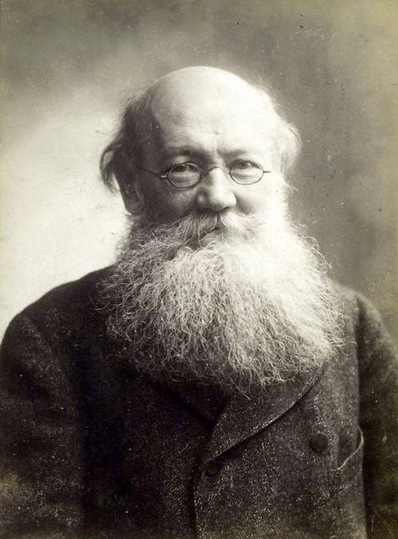The views expressed in our content reflect individual perspectives and do not represent the authoritative views of the Baha'i Faith.
In the previous essay in this series, we focused on the modern evolutionary synthesis, the generally agreed-upon theory of evolution in use by the overwhelming majority of scientists today. Proven by thousands of research studies and the fossil record itself, this new synthesis melds Darwin’s modification of species theory with the results of more recent science–including a remarkable set of discoveries made by the renowned Russian scientist, geographer and evolutionary theorist Pyotr Kropotkin.
In his landmark 1902 book Mutual Aid: A Factor of Evolution, Kropotkin explained evolution as a primarily cooperative process, rather than a competitive one. This organic cooperation, Kropotkin’s work convinced him, originates in the mutual struggle of all life, and culminates in the mutual aid that individuals freely give to one another, which then drives natural selection.
Kropotkin’s theories—now recognized as valid, and fully incorporated into the new synthesis, as well as into the fundamental principles of the science of ecology—concluded that “the evolutionary emphasis on cooperation rather than competition” drove the evolution of all species, including human beings. Rather than the fierce hierarchies of competition the social Darwinists proposed, Kropotkin wrote that the majority of all species live in groups or societies—and in turn those societies protect, nourish and facilitate the evolutionary growth of the individual:
The animal species… in which individual struggle has been reduced to its narrowest limits… and the practice of mutual aid has attained the greatest development… are invariably the most numerous, the most prosperous, and the most open to further progress. …it was an evolutionary emphasis on cooperation instead of competition in the Darwinian sense that made for the success of species, including the human.
Kropotkin based his scientific findings on extensive studies of the strong cooperative tendencies that allowed tribal and indigenous peoples to survive—which amply demonstrate that competition did not always play a predominant role in all human social organization. In fact, his research convinced him, most pre-industrial societies actively found ways to mutually aid and support one another. Those indigenous societies found ways to limit the accumulation of wealth across generations or classes, thus ensuring a more equitable distribution of resources among the group, and a more cooperative and egalitarian social structure. That structure allowed for the ongoing maintenance of the species, ensuring the health and prosperity of the maximum number of individuals, which in turn gave the social unit increased strength and cohesiveness.
This critically important factor in human development often gets left out of discussions of evolution—even though it has become a recognized, primary part of the new synthesis of evolutionary theory.
The scientific community now fully acknowledges, as the science of ecology and the new discoveries about DNA have both revealed, that cooperative interaction has an enormous impact on how we evolve.
The Baha’i teachings agree. With their Faith’s emphasis on unity, peaceful cooperation and mutuality, Baha’is view the process of human evolution as one that increasingly emphasizes interaction, concord and harmony between races, peoples and nations. This growth of mutual aid and assistance comes primarily, the Baha’i Faith asserts, from humanity’s higher spiritual instincts and endeavors—the forces that work to eradicate the prejudices, hatreds and wars which retard human evolution:
And among the teachings of Baha’u’llah is that religious, racial, political, economic and patriotic prejudices destroy the edifice of humanity. As long as these prejudices prevail, the world of humanity will not have rest. For a period of 6,000 years history informs us about the world of humanity. During these 6,000 years the world of humanity has not been free from war, strife, murder and bloodthirstiness. In every period war has been waged in one country or another and that war was due to either religious prejudice, racial prejudice, political prejudice or patriotic prejudice. It has therefore been ascertained and proved that all prejudices are destructive of the human edifice. As long as these prejudices persist, the struggle for existence must remain dominant, and bloodthirstiness and rapacity continue. Therefore, even as was the case in the past, the world of humanity cannot be saved from the darkness of nature and cannot attain illumination except through the abandonment of prejudices and the acquisition of the morals of the Kingdom. – Abdu’l-Baha, Selections from the Writings of Abdu’l-Baha, p. 299.
Kropotkin’s theory of mutual aid and assistance helps us understand the complex dynamics of how we evolve. It balances competition with cooperation, reasoning that the health of the body politic helps facilitate the health of the individual body, and bring about our evolutionary progress as a species.
The next time you ponder evolution, consider seeing it in these terms. Rather than a struggle for existence that emphasizes the survival of the fittest individual, think about it as a system of mutual aid and assistance that functions in a harmonious way to lift up an entire species. You’ll find that it may increase your desire for a beneficial connection to others and lead to a growing sense of empathy and unity with your fellow human beings.

















Comments
Sign in or create an account
Continue with Googleor